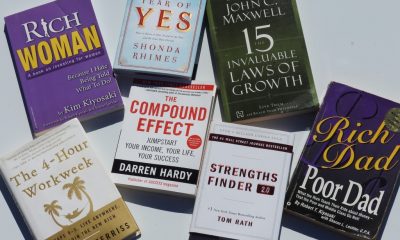Deep Work by Cal Newport – Book Review
December 9, 2019 8:00 AM EST | 20 min read
Cal Newport is a professor of computer science at Georgetown University, a blogger, and the author of six different self-improvement books.
And he’s only 37 years old.
Hesays key to his productivity and success is his ability to do Deep Work—to lockin on intense periods of focused work for long stretches of a time.
Cal has never had a Facebook or Twitter account.
Throughout the years, he has impressively managed to avoid getting on social media.
He does run a blog.
But his author website features no email address.
So he is hard to reach.
Cal has made it nearly impossible for technology like email and social media to distract him from his work.
Going deep and staying focused allowed him to generate powerful results in his life.
In his book Deep Work: Rules for Focused Success in a Distracted World, Cal uses personal experience and psychology research to explain why distraction-free and intensely focused work sessions are so important.
And he lays out some principles for how to make Deep Work your way of life.
Calsays the ability to do long stretches of focused high priority work is key forthriving in your career, becoming an elite performer, producing really highquality work, and enjoying more fulfillment on a day to day basis.
Deep Work means locking into important tasks with intense concentration for long stretches of time on a daily or weekly basis.
Deep Work is increasingly rare, important, valuable, crucial, life-changing, therapeutic, relaxing, satisfying, and necessary for becoming exceptional at what you do.
Cal Defines Deep Work as “professional activities performed in a state of distraction-free concentration that push your cognitive capabilities to their limit.
These efforts create new value, improve your skill, and are hard to replicate.”
Cal Newport is not the only person who has succeeded through a strong commitment to Deep Work.
Many highly successful people of the past and present have used Deep Work to their advantage.
Even though social media was gained tons of popularity during her epic rise to success, J.K. Rowling was completely absent from platforms like Facebook and Twitter during that stretch of time when she wrote her Harry Potter novels.
Rowling’s staff finally started a Twitter account under her name in 2009, as she was writing The Casual Vacancy.
But for a year and half, her first and only tweet read: “This is the real me, but you won’t be hearing from me often I am afraid, as pen and paper is my priority at the moment.”
Rowling’s books have sold more than 500 million copies.
Harry Potter is the best selling book series in world history and the basis for a highly popular movie franchise.
J.K. Rowling was only able to make all of that happen through a philosophy of undistracted Deep Work.
Bill Gates is another highly successful Deep Worker.
There was period of time when Bill would leave behind his personal and work obligations on a yearly basis and travel out to an isolated cabin for Think Weeks—for the purpose of reading books, thinking deeply, and pondering big ideas without any distractions.
Cal describes the striking story of how Bill Gates initially founded Microsoft.
In 1974, Bill Gates was still a student at Harvard.
Young Gates saw the Altair, the world’s first personal computer, on the cover of a magazine called Popular Electronics.
Then and there, he knew there was a big opportunity to design software for the Altair.
And he was going to make it happen.
Within just 8 weeks, Gates dropped everything, got together with some partners, and worked as hard as possible on hacking together a programming language for the Altair.
Bill’s partners Paul Allen and Monte Davidoff were witness to Bill’s intense and above average levels of focus during that 8-week-period of time.
Gates would go to work with so much intensity, that he would often fall fast asleep for an hour or two while writing code right on his keyboard, wake up, and get straight back to work without pausing.
Gates was obsessively focused on creating that programming language.
Bill’s intense focus and commitment to long sessions of Deep Work were the key that allowed him and partners to start Microsoft, create a billion dollar industry, and change the world.
The life of director, writer, and actor, Woody Allen is another powerful example of the incredible results that Deep Work can create.
Between 1969 and 2013, Woody Allen wrote and directed 44 films that were nominated for 23 Academy Awards!
And he accomplished all of this without using a computer.
Allen freed himself from distraction by using a typewriter for all of those films.
Distraction-free Deep Work allowed Allen to generate an absurd level of productivity and results.
It doesn’t stop with J.K. Rowling, Bill Gates, and Woody Allen.
If you examine any person who has consistently maintained a high level of results and success over a long span of years or decades, you will see that Deep Work is the common ingredient in their rises to the top of their fields.
Newport felt the need to write a book about the importance and power of this intense focus, discipline, dedication, and work ethic because Deep Work has become very rare in our society today.
Due to distracting technology like the Internet, email, smart phones, text messaging, tablets, and social media, Deep Work has become very uncommon.
Instead of going deep, people are doing Shallow Work.
Cal defines Shallow Work as non-cognitively demanding tasks that are often performed while distracted.
These efforts usually do not create much value in the world and they are easily replicated.
Due to email, smart phones, social media, and other technology, doing Deep Work has really become a struggle in today’s society.
Even when people do manage to focus in on a project or goal, they will usually check their email or check their social media every 15 or 30 minutes to see if they have any new updates or notifications.
As a result, we generally aren’t doing long stretches of work in a distraction-free state of concentration.
Many people are doing distracted work, because it’s super-difficult not to.
Since our culture is shifting towards the shallow work, there is now a huge opportunity for those who can resist the distraction and commit to going deep.
Since we are surrounded by shallow activity, prioritizing depth can turn you into one of the most productive and successful people at your company or in your field.
Deep Work is the key to standing out among your peers, producing amazing results, becoming an elite performer, and rising to the top.
Going deep is necessary for anyone, in any career field, who is looking to climb the ladder of success and rise above mediocrity: “Whether you’re a computer programmer, writer, marketer, consultant, or entrepreneur . . .
To succeed you have to produce the absolute best stuff you’re capable of producing—a task that requires depth.”
The practice of Deep Worker is increasingly rare and increasingly valuable.
Those who cultivate the ability to do Deep Work and who make it the core of their professional life will thrive.
This is especially true because of the times we are living in.
Automation, artificial intelligence, and intelligent machines are poised to replace a large percentage of human jobs within the coming decades and throughout the rest of the 21st century.
Calsays that in this coming age of automation, there are 2 abilities that willhelp anyone thrive in the New Economy:
- The ability to master things quickly.
- The ability to produce results at an elite level, in terms of quality and speed.
To avoid getting replaced by machines, you will need the ability to quickly gain new information, skills, talents, and knowledge.
You’ll need to master new things within a short time-frame.
Regardless of whether automation is a threat to your job or not, a strong capacity for learning is crucial character-trait for becoming a superstar in any career-track.
To reach an elite level at anything, you need to learn the information, knowledge, and skills that will allow you to rise to the top.
AsCal says, “If you can’t learn, you can’t thrive.”
Inaddition to learning quickly, top performers need to be able to produce resultsconsistently with speed, quality, and consistency.
Both of these core abilities above depend on Deep Work.
Without Deep Work, it isn’t possible to master things quickly or produce consistent results with quality and speed.
You need to go deep to gain knowledge and acquire new skills.
Deeply focused learning will keep you competitive, employed, valuable, and successful, even when automation is replacing jobs all around us.
And going deep is a must for producing high quality results consistently.
Cal explains this Law of Productivity to help prove his point:
High Quality Work Produced =(Time Spent) x (Intensity of Focus)
High quality work isn’t just about the amount of time you spend hammering away at the project.
It’s about the quality and intensity of your focus.
Deep, uninterrupted, and intense focus is crucial.
Because no matter how great you think you are at multi-tasking, it’s impossible to do two things well at the same time.
Research shows that when switch from one task into another, your full attention doesn’t immediately go from Task A to Task B.
Instead, “a residue of your attention remains stuck thinking about the original task.”
That attention residue is what makes multi-tasking so much less effective than doing Deep Work.
When people multi-task, they tend to perform poorly on each task because their attention is unfocused, divided, and distracted.
You will also enjoy our article on Stop Getting Distracted and Get Things Done.
The previous task always distracts attention from the current one.
Digital distraction is commonplace nowadays and you might think it isn’t doing any harm.
But checking your social media or email every 5, 10, or 15 minutes during work your will distract your attention, bring down the quality of your work, and hurt your results.
To produce at peak levels you need to work for extended periods of time with full concentration on a single task free from interruptions.
Without that, it is really challenging to produce high quality work at an elite level.
That’swhy Deep Workers almost always outperform their distracted competition.
Deep Work isn’t just a powerful way to become a superstar at what you do in your career.
Deep Work is also inherently satisfying, meaningful, and fulfilling.
It can lead to lots of profit and success in your professional life and it’s also a powerful path to feeling consistently happy and satisfied.
“Adeep life is not just economically lucrative, but also a life well lived.”
For those who do shallow and unfocused work, distraction, stress, irritation, frustration and trivial concerns dominate their days because small issues are constantly at the forefront of their attention.
And when you lose focus, your mind tends to switch focus to what’s going wrong rather than what’s right.
So shallow work can actually drive unhappiness.
Deep Work does the opposite.
A psychologist named Mihaly Csikszentmihalyi has spent his career studying a state of mind called Flow, a mental state that many expert-level workers and performers tend to experience while they are at work.
Flow is a type of work where there are goals, feedback, challenges, deep concentration, and a loss on oneself in the task at hand.
Flow is synonymous with Deep Work.
And it is a powerful way to set yourself up for happiness.
Going deep into your work is, in itself, very rewarding because our minds love the challenge.
Flow and Deep Work order your consciousness in a way that makes your life more meaningful and enjoyable.
So for maximum happiness, satisfaction, fulfillment, and growth, Cal recommends doing as much Deep Work as possible in your professional life and in your personal life as well.
Deep Work isn’t just for the office.
Make sure to find structured, constructive, meaningful, and valuable Deep Work activities and hobbies to fill your free time with as well.
Don’t just spend your leisure time on mindlessly surfing social media, the Internet, and television.
Do something meaningful and constructive with your free time like read self-development books, consume educational content, take up painting, learn a new instrument, learn a foreign language, or learn a new skill.
Givingyour mind something meaningful to work on at all hours will actually boost yourfulfillment and peace of mind.
Build your work and personal lives around experiencing as much Flow and Deep Work as possible.
It’s a path to more fulfillment, peace of mind, and life-satisfaction.
Strategiesfor Making Deep Work Your Way of Life
Sowhat are the best ways to fully commit yourself to doing Deep Work on aday-to-day or week-to-week basis?
First off, it’s important to understand that there is a difference between being busy and being productive.
Try to establish clear indicators of what it actually means to do high quality work.
Without those high performance standards, you might end up dong lots of activity without any real results.
You’ll stay busy without actually getting anything meaningful done.
And keep in mind that as human beings, we go into every day with only a finite amount of willpower.
We have a limited supply of willpower that depletes as we use it.
So don’t rely on your willpower to stay disciplined with your Deep Work!
Instead, make Deep Work a ritual, routine, and habit.
Making it a habit will minimize the amount of willpower you need to get started.
Another important step is deciding what your Deep Work Philosophy is.
There are several different approaches that you can use to make Deep Work into your life.
Each of them is a viable way to make it happen.
You just have to decide which one works best for you.
The Monastic Philosophy means completely disconnecting from all shallow obligations and distractions like email and social media forever.
So you can focus on Deep Work.
Cal Newport is a practitioner of the Monastic Philosophy.
He has never joined Facebook or Twitter.
And he doesn’t have an author email address that fans can reach him on.
He has almost completely cut himself off from digital distraction.
It is an extreme approach.
And it’s not for everybody.
But it’s powerful way to make it happen.
The Bimodal Philosophy means disconnecting from shallow activities for long stretches of scheduled Deep Work—dedicating full days, weeks, or months at a time for Deep Work sessions.
Then you can spend the rest of your time however you like.
The Rhythmic Philosophy means turning your Deep Work sessions into a consistent habit, getting into a rhythm with your grind sessions.
It means doing Deep Work at the same times of the day or night, so you can establish a strong pattern.
Eventually, you will not have to rely on your willpower to get started.
As opposed to the Bimodal Philosophy, the Rhythmic approach is about consistently spending full hours, instead of full days or full weeks doing your Deep Work.
The last approach is reserved for the fortunate few who have the ability to turn on intense focus and concentration at any time or place.
It’s called The Journalistic Philosophy of Deep Work—because journalists are expected to shift into writing mode at a moment’s notice to meet their deadlines.
With the Journalistic approach, you use any spare time you can find to do your Deep Work.
But this Journalistic style of working requires a lot of practice and confidence in your abilities.
So this will not work well for someone who just getting started with their Deep Work.
This requires a lot of practice and confidence in your abilities.
So for the majority of us, this will not be a viable option.
Once you’ve chosen your philosophy, it’s important to ritualize your Deep Work sessions.
Create rituals, rules, guidelines, and principles to govern how you do your work.
Decide where you will get your work done and for how long.
You need a specific timeframe for the work sessions and a specific location.
If you can identify a location that you will use only for your Deep Work sessions, you results will be even better.
You should also have rules, processes, and procedures in regards to how you get your work done.
Rules could include typing a certain number of words per minute, shutting off your Internet and social media access during the session, or leaving your smartphone in another room.
Also, you need to provide the right support and nourishment for yourself, your body, and your brain during the Deep Work sessions.
This could mean doing some light exercise before, during, or after the session; eating the right foods; drinking the right type of coffee; drinking some green tea; or setting up the right amount of lighting.
Here’s another tactic you can put to use: give yourself a deadline for a high priority project that is drastically shorter than usual.
Commit yourself to getting this task done within a short timeframe.
Do publicly if possible.
Or tell a friend.
You can also set a timer up to put the pressure on.
This short deadline will force you to work with more intensity, less procrastination, and less distraction.
Cal’s most outside-the-box strategy for doing Deep Work is called the Grand Gesture.
The Grand Gesture involves creating a drastic and dramatic change to your normal work environment by investing a significant amount of effort or money for the purpose of getting your Deep Work done.
Going above and beyond to get your Deep Work done increases your mind’s perceived importance of your task and it reduces your natural tendency to procrastinate.
The Grand Gesture strategy can deliver “an injection of motivation and energy.”
When you take lots of time off, travel to a distant location, spend lots of money, put in lots of effort, or go to extreme measures for the Deep Work, the commitment signals to your brain that this is a high priority.
Since your brain understands the importance of the task, it unleashes mental resources needed to get it done!
For example, when J.K. Rowling was writing Deathly Hallows—the last of the Harry Potter books—there was too much commotion going on at her house.
She couldn’t focus.
So in order to get herself in the right frame of mind to get the work done, she checked herself into a suite at a 5-star luxurious hotel purely for the purpose of finishing up her writing.
On her first day there, she got so much writing done, that she actually wound up finishing the book at the hotel suite.
Bill Gates had his Think Weeks where he would travel out to an isolated cabin to read books and think big thoughts.
Author Dan Pink took that idea a step further by actually building a cabin on his property for the sole purpose of doing his writing there.
It’s an extreme strategy.
But it worked in his favor.
Entrepreneur and author Peter Shankman once had 2 weeks to write an entire book manuscript, a feat that would require intense focus and concentration.
To get this done, Peter actually booked a round trip flight to Tokyo, Japan.
But he didn’t actually spend any time in Japan.
He spent a few hours at the airport in Tokyo, then immediately hopped on another flight to come back.
He spent the entire flight to Tokyo and the whole flight back working on his book.
Within just 30 hours, Peter finished writing the entire book, a task that may never have been possible without this epic Grand Gesture.
Even though Deep Work can be very therapeutic, joyful, exciting, and relaxing, it’s important to know when to give it a rest.
Research shows that, like will power, direct attention is a finite resource.
If you use your direct attention for long enough, you’ll eventually start to lose your focus.
So it is very important to give your mind some uninterrupted downtime when your Deep Work is over to restore and rejuvenate your ability to pay focused attention.
Once you’re done with the Deep Work, it’s best to shut off the work completely and give your brain sometime to replenish those mental resources.
Shutting down completely means avoiding checking or responding to emails and avoiding all work-related activities.
Any work that you try to tackle in the evening is most likely a low value task that isn’t going to move our career forward and it should wait until the next day.
Hesays: “When you work, work hard. When you’re done, be done.”
Leavethe Distracted Masses Behind. Join the Focused Few.
Cal ends Deep Work by saying: “To leave the distracted masses to join the focused few is a transformative experience.”
Basedon my personal experience, I have to agree.
This book really resonated because I was in a state of Deep Work as I read it.
And I was in a mental state of deep concentration as I wrote this book review as well.
As I reflect back on the past 7 years of my life, Deep Work has actually changed, transformed, and improved my life in numerous ways.
Some call it Flow.
Some call it the Zone.
Some call it Locking In.
Cal Newport calls it Deep Work.
Whatever you want to call it, doing intense sessions of focused work, reading, writing, creativity, and video editing, has put me on a path to success and given me a daily source of constant happiness.
Watching television used to be the highlight of my days.
Now, writing, editing, and reading have become the most relaxing and happiest moments of my weeks.
Even though Deep Work has boosted my productivity, my improved happiness, mental health, fulfillment, and relaxation are the most important rewards for my Deep Work sessions.
Because when it comes down to it, happiness is more important than success.
As Tony Robbins often says, “Success without fulfillment is the ultimate failure.”
So even though technology like social media have given billions of people a voice, connected humanity in new and amazing ways, and improved our lives.
Technology, smart phones, email, social platforms, and tablets have distracted us more than ever, damaged our ability to focus in on our work, and have decreased our happiness.
Ifthere is one thing that can help you reverse this problem, it’s Deep Work.
Choose concentration over distraction.
Unplug from the technology.
And jump in to a commitment to regular distraction free work sessions on a daily or weekly basis.
Leave behind the distracted masses.
And join the focused few.
Doing so could mean the difference between an average and unhappy life versus a fulfilled and phenomenal one.
To learn more information about the benefits of deep focus, check out Deep Work: Rules for Focused Success in a Distracted World.
If you enjoyed this book review and you are looking to learn more key lessons and insights from all of the best self-development and non-fiction books without sacrificing too much time from your schedule, try Blinkist.
Blinkist is a service that provides quick breakdowns of the key ideas and insights from the world’s best books within 15 minutes of text and audio.











